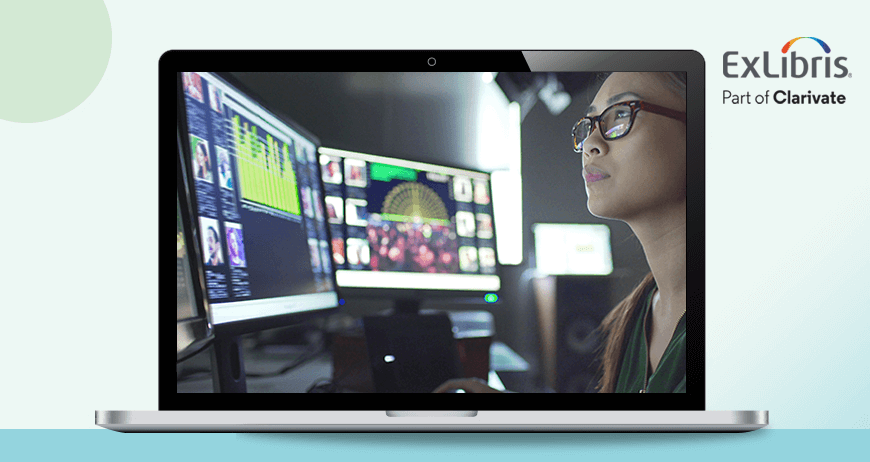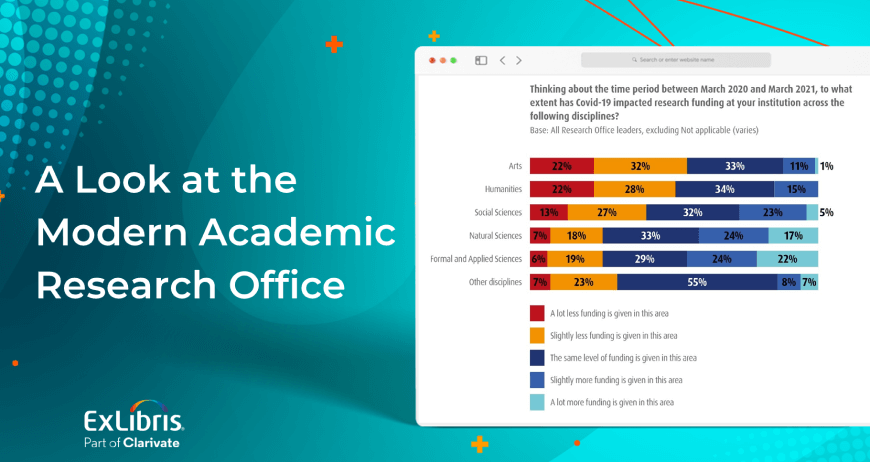In continuation of our overview of the Ex Libris annual research report, Supporting Academic Research: Understanding the challenges, let’s look at how Research Office leaders see the current and future state of academic research.
The 2021 report, which follows two similar studies carried out in 2020 and 2019, is based on survey responses from over 400 researchers and Research Office leaders. Among the 106 senior members of Research Offices surveyed, 41% were from the United Kingdom, 37% from the United States and 23% from Australia.
The Search for Research Funding
Growing involvement of the Research Office
In 2021, it became more common for researchers to seek and receive support from the Research Office in finding relevant funding opportunities, with 54% of them saying they had done so. In 2020, that number was just 45%.
For their part, Research Office staff polled in the Ex Libris study said that obtaining funding for research activities is their top priority. However, many are also finding it a struggle, with about 40% calling it one of their top three challenges.
With the increased competition for funding, the trend of more widely available support from the Research Office is likely to continue in the foreseeable future. However, the Research Office leaders noted a significant shift in the levels of funding available for research in different disciplines in the wake of the Covid-19 pandemic. About half of those polled said funding has become less available for research in the arts and humanities and more available in STEM fields.
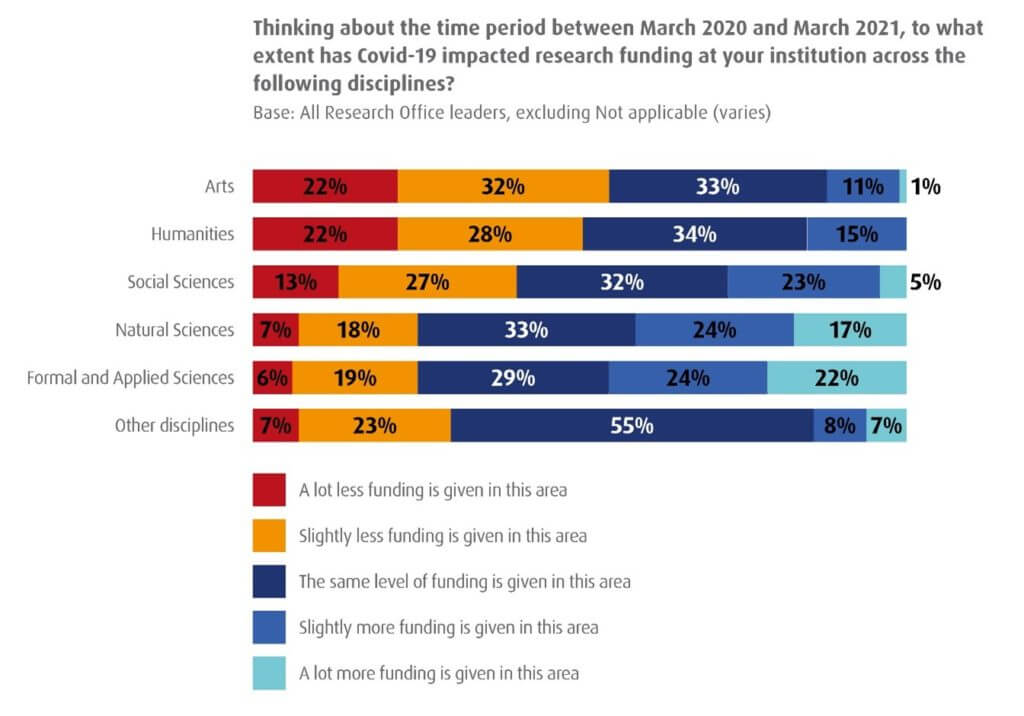
Showcasing Research Expertise
The Research Office can help keep researcher profiles up to date
The number of academic institutions with a research portal displaying the profiles and publications of their faculty members significantly increased from 2020 (60%) to 2021 (77%), according to Research Office leaders. Despite the apparent effort to be more active in showcasing research, Research Office leaders say only 61% of such portals are up to date. Nonetheless, this is a six-percent improvement over 2020.
In practice, only 43% of researchers say that they keep their profile fully up to date. This is an opportunity for the Research Office to step up and provide the tools and support researchers need to ensure their output is accurately showcased by their institution.
Do you keep your profile up to date?
Base: Respondents who have a profile associated with their academic work (301)
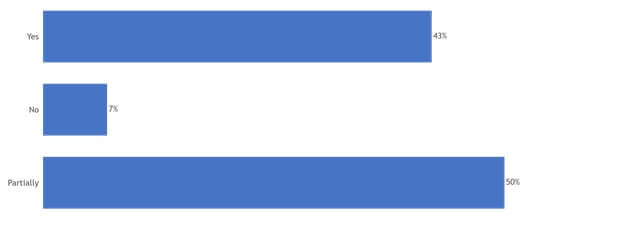
Demonstrating Research Impact
An important priority, but researchers and Research Office leaders differ
Demonstrating the impact of an institution’s research was ranked as the second most important priority for Research Office leaders in 2021. Of those surveyed, 50% cited it as a priority, compared to 38% in 2020. Similarly, Research Office leaders say they are required by funders and institutions to demonstrate the impact of research publications more frequently than in the past.
But the methods used to measure research impact are changing. Citations remain the most popular metric, but alternative metrics have increased in importance for senior members of the Research Office. Most notably, the proportion of Research Office leaders measuring social impact has increased by 13% and they are more likely than researchers to reference that metric (57% as compared to 28%). The Research Office is also more likely than researchers to give weight to policy papers (47%), government regulations and cross-institution collaboration (46%).
While an emphasis on alternative metrics for measuring research impact was already evident pre-Covid-19, the pandemic has intensified the focus on indicators of how academic research influences public policy. This trend is likely to continue.
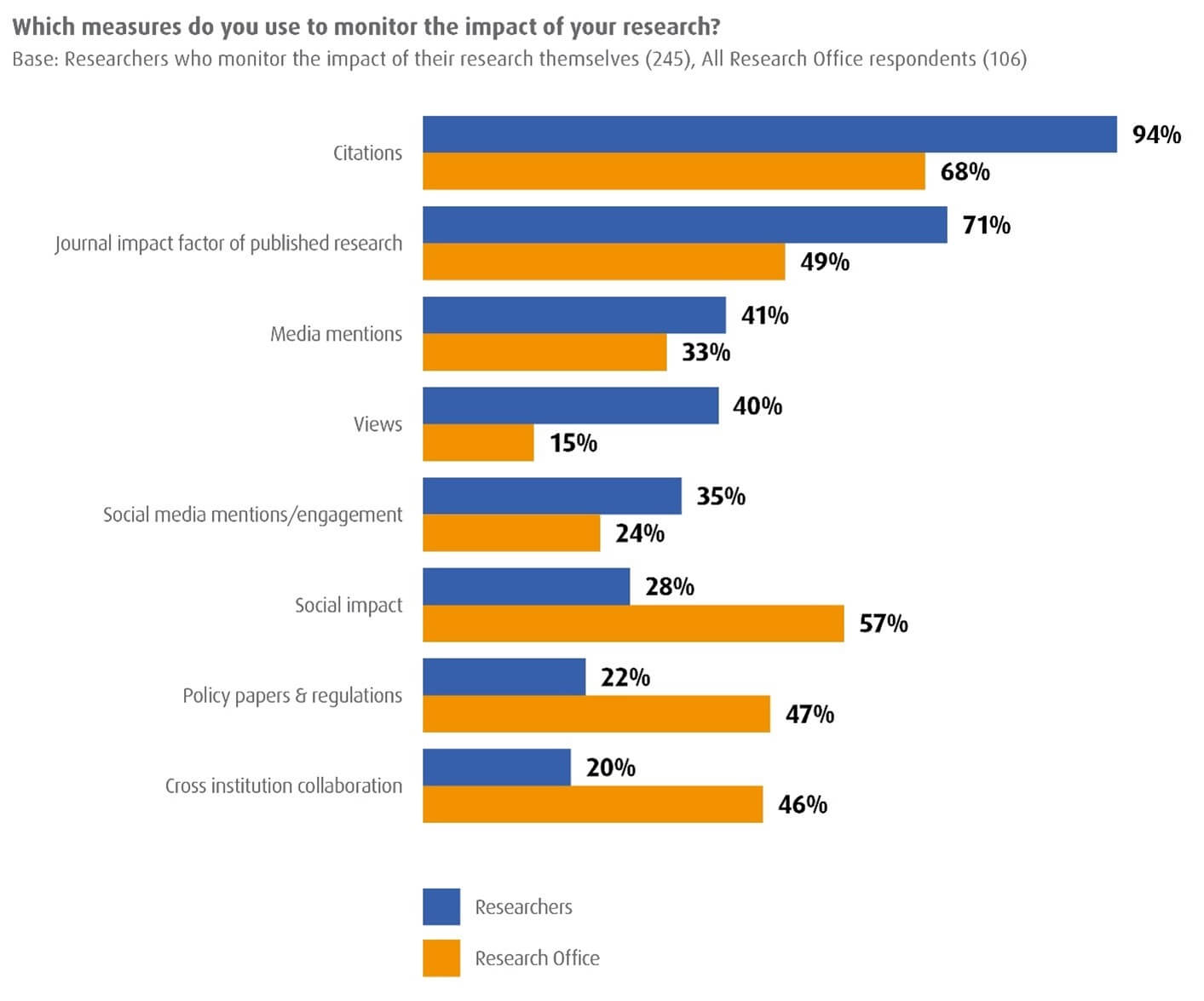
Relieving Administrative Tasks
What the Research Office is doing for researchers
Over half of the researchers surveyed reported spending 30% or more of their time on purely administrative activities. Among these tasks, 54% of researchers say they get support finding sources of funding from the Research Office. This represents an increase over 2020 (45%). Thirty-five percent of researchers surveyed said the Research Office assists them with applying for funding grants.
Research Office leaders are reportedly finding it challenging to provide researchers with greater support, as their offices are suffering from limited resources and time. Yet, much greater levels of support are needed if the Research Office is to substantially reduce the time researchers have to spend on routine administrative tasks.
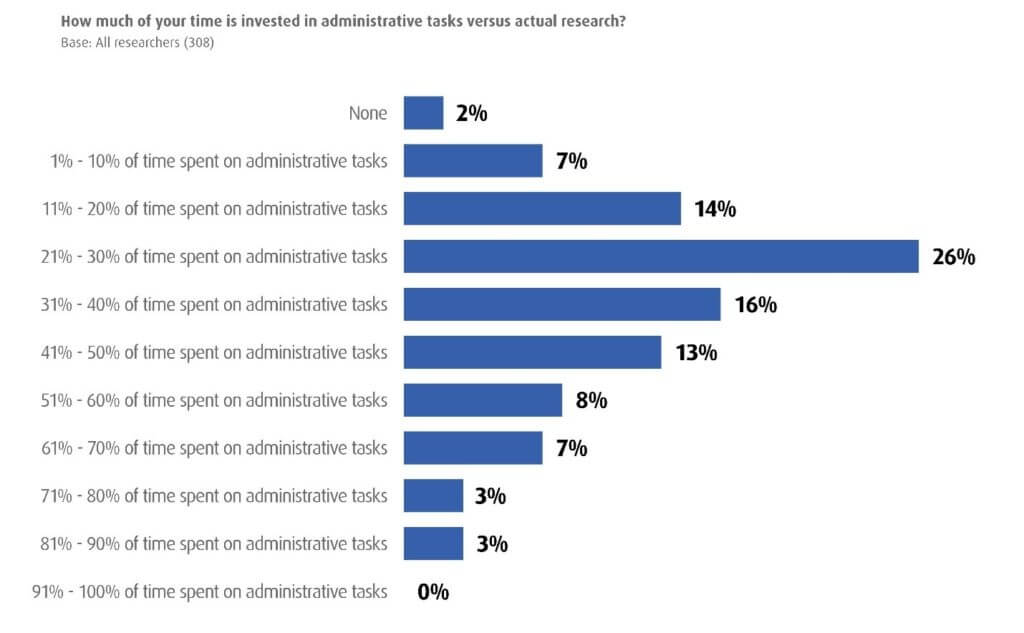
Academic Collaboration
The Research Office supports on- and off-campus collaborations
Around 70% of researchers say that half or more of their work involves interdisciplinary collaborations, while 46% collaborate across departments within their own institution. Research Office leaders see promoting such collaborations as one of their priorities, with 25% naming interdisciplinary collaboration and 23% highlighting collaborations with partners outside their institution.
The Covid-19 pandemic has posed sudden, disruptive challenges for collaborators across many industries, especially those that require in-person interactions. This has proven true for academic research, as well. Unfortunately, only 27% of researchers are satisfied with the level of support they have received from their institution in finding collaborators during the Covid-19 pandemic. Here, too, the Research Office may be able to offer more assistance going forward.
The Research Office and the Library
A significant partnership in managing research
Research Office leaders noted an increase in their collaboration with institutional libraries over the course of 2021. Fifty-four percent say their library is one of their main partners, after researchers (92%) and faculty deans (75%). In addition, almost 75% of Research Office leaders surveyed are happy with their level of collaboration with the library (a 9% increase over 2020). One in four respondents would like to see a further increase.
The main area of cooperation between Research Offices and libraries, according to the Ex Libris report, was open access compliance. However, this is not a universal phenomenon across the areas surveyed. Respondents from the UK appear to be collaborating in this area much more than their United States and Australian counterparts.
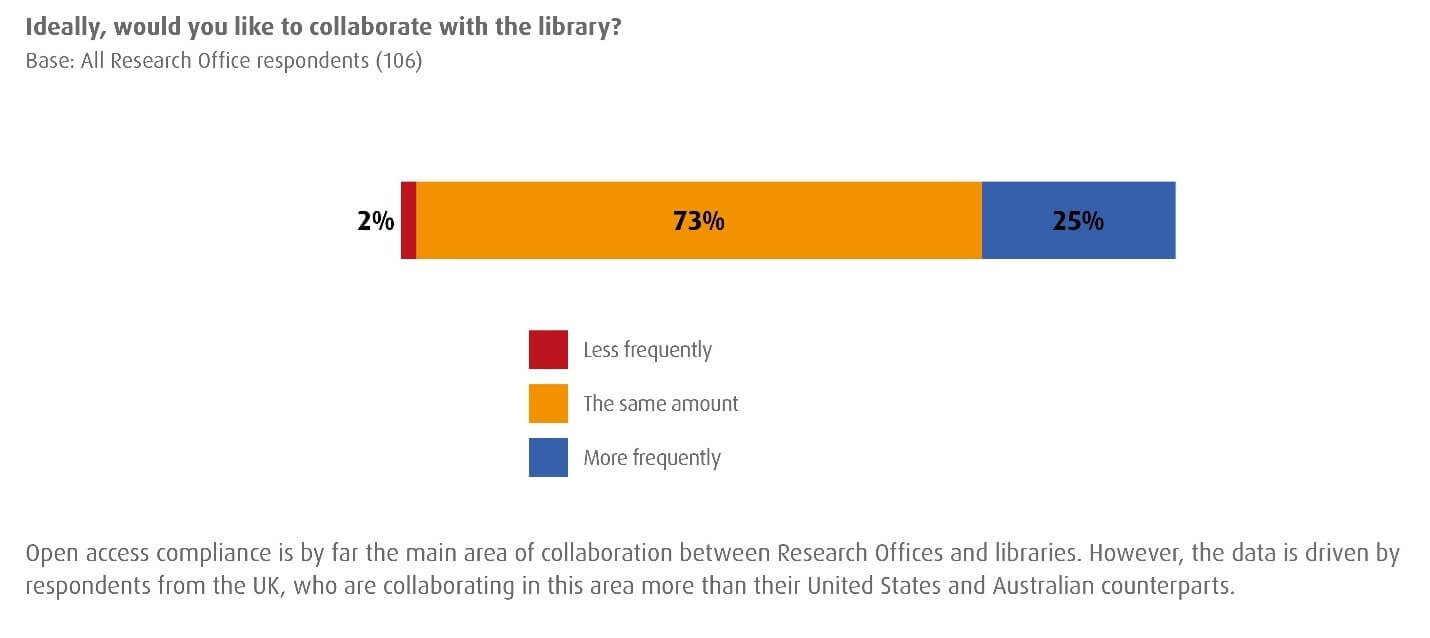
Working Remotely
Despite support for remote working, substantial challenges remain
Almost half of Research Office leaders polled categorized work disruptions caused by the Covid-19 restrictions as “high.” And all respondents said there had been at least some level of disruption to research at their institution as a result of the pandemic.
Universities have provided sufficient support for the shift to remote work for the most part; however, researchers also expressed a need for more assistance with finding funding, identifying collaborators and conducting research. These are areas where the Research Office can provide support both remotely and on campus.
Expectations
What do researchers expect from the Research Office?
Researchers surveyed for the Ex Libris study expressed general satisfaction with the support they receive from their institution’s library and Research Office. They expect more from the library going forward, while their expectations from the Research Office remained the same in many areas – but not all.
Researchers have expressed a notably higher expectation in 2021 that the Research Office will provide support for regulatory compliance – 44%, as compared to 27% in 2020. On the other hand, their expectation that the office will facilitate access to funding opportunities dropped slightly, from 79% to 72%. In other areas, there has been almost no change in the level of researcher expectations regarding the Research Office supporting funding proposals or submissions, facilitating collaboration across institutions, and reporting on research project progress to funders.
For a more in-depth look at what Research Office personnel and researchers think about supporting academic research, read the full report here.

